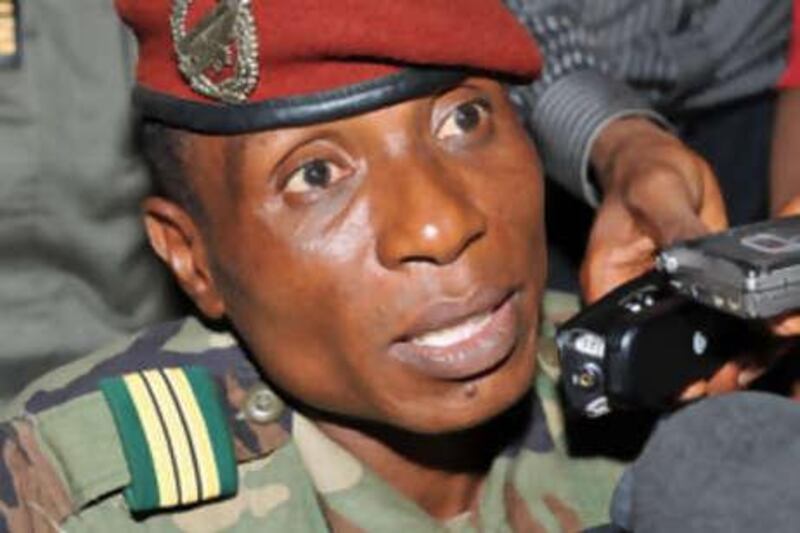A military junta tightened its grip on Guinea yesterday, calling for a nationwide curfew and ruling out elections for two years as its leader paraded through the capital with hundreds of troops. The putschists issued a statement declaring that Capt Moussa Dadis Camara, a mid-ranking officer who had previously been head of the military's fuel supplies unit, was now in charge. Mr Camara, who led a coup in Guinea following the death of president Lansana Conte, said yesterday that he was the new "president of the republic."
"I am convinced, reassured that I am the president of the republic, the head of the (junta's) National Council for Democracy and Development (CNDD)," he said at his first press conference, noting a "big movement of support" in the country "from the military camp to the level of the presidential palace." Capt Camara's remarks came as international condemnation grew against the putschists' bid for power following the death of long-time strongman Mr Conte on Monday.
In an apparent show of strength, several hundred soldiers backing Capt Camara left the main military base near the international airport and began parading through Conakry. They stopped at another military base, Camp Kundara, which houses the presidential guard, then headed for the state broadcasting headquarters, some chanting: "Long live the new leader." Capt Camara joined them in different areas of the capital and a crowd of thousands of his supporters thronged the streets that surround the presidential palace and the government ministries, before dispersing peacefully.
International condemnation meanwhile grew with the African Union warning of "stern measures" if the military ignored calls to allow a democratic transition of power following the death of the long-time dictator, Mr Conte. Mr Conte had ruled with an iron fist since 1984 and within hours of his passing late on Monday, a group of soldiers took control of the airwaves and claimed to have seized power in the impoverished but mineral-rich west African state.
The United States threatened to suspend its aid, about US$15 million (Dh55m) this year, if military coup leaders do not take steps to return civilian rule. "One of the things we want to see immediately is a restoration of a civilian democratic rule," said state department spokesman Robert Wood. Capt Camara plans to lead a 32-member interim administration, made up of 26 military officers and six civilians, and has promised to hold new elections in December 2010.
In another appeasing move, the junta said that it would delay imposing a curfew until Friday "to allow Christians to celebrate a peaceful Christmas holiday," according to a statement read on national radio. The prime minister, Ahmed Tidiane Souare, has maintained his government is still in charge and the UN's special envoy to West Africa said yesterday it was too early to gauge who was in control of the country.
"No camp has so far been able to ascertain its position," Mr Djinnit told an emergency meeting of the African Union's Peace and Security Council in the Ethiopian capital. "On the one hand, you've got a group of 32 people who wants power and pretends the situation is under their control. On the other hand, the government and the army chief staff are still there and claim they are in power." In Dakar, the rights group, African Assembly for the Defence of Human Rights or Raddho, called on the international community to prevent "chaos" in Guinea, calling it a "veritable time bomb" in west Africa.
The putschists claimed to be acting to preserve Guinea's territorial integrity and alleged that troops loyal to the Conte regime had been seeking intervention from foreign mercenaries from neighbouring countries. "People of Guinea, the seizure of power by your army is a civic act which responds to the wish to save a people in distress. Proud of having accomplished this task, (the junta) has no wish to cling on to power," a statement said.
Leader since 1984 when he ousted Guinea's first president Ahmed Sekou Toure, Mr Conte was a chain smoker who suffered from chronic diabetes and was at one time diagnosed with leukaemia. He had relied on the army along with his clan to bolster his authority, but in recent years social tension and criticism of his regime had become increasingly open. Mr Conte's state funeral will be held in his home village tomorrow, a family source said.
Guinea, a small nation of about 10 million people, is the world's leading exporter of bauxite, an ore from which aluminium is produced. *AFP





